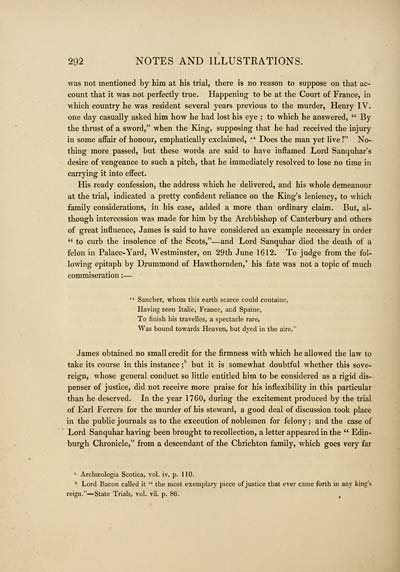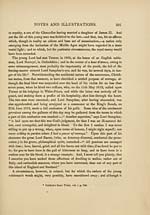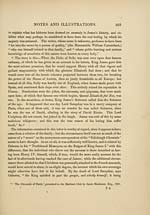Inglis Collection of printed music > Printed text > Ancient Scotish melodies from a manuscript of the reign of King James VI
(338) Page 292
Download files
Complete book:
Individual page:
Thumbnail gallery: Grid view | List view

292 NOTES AND ILLUSTRATIONS.
was not mentioned by him at his trial, there is no reason to suppose on that ac-
count that it was not perfectly true. Happening to be at the Court of France, in
which country he was resident several years previous to the murder, Henry IV.
one day casually asked him how he had lost his eye ; to which he answered, " By
the thrust of a sword," when the King, supposing that he had received the injury
in some affair of honour, emphatically exclaimed, »* Does the man yet live !" No-
thing more passed, but these words are said to have inflamed Lord Sanquhar's
desire of vengeance to such a pitch, that he immediately resolved to lose no time in
carrying it into effect.
His ready confession, the address which he delivered, and his whole demeanour
at the trial, indicated a pretty confident reliance on the King's leniency, to which
family considerations, in his case, added a more than ordinary claim. But, al-
though intercession was made for him by the Archbishop of Canterbury and others
of great influence, James is said to have considered an example necessary in order
" to curb the insolence of the Scots," — and Lord Sanquhar died the death of a
felon in Palace- Yard, Westminster, on 29th June 1612. To judge from the fol-
lowing epitaph by Drummond of Hawthornden," his fate was not a topic of much
commiseration : —
' ' Sancher, whom this earth scarce could containe,
Having seen Italie, France, and Spaine,
To finish his travelles, a spectacle rare,
Was bound towards Heaven, but dyed in the aire."
James obtained no small credit for the firmness with which he allowed the law to
take its course in this instance ; b but it is somewhat doubtful whether this sove-
reign, whose general conduct so little entitled him to be considered as a rigid dis-
penser of justice, did not receive more praise for his inflexibility in this particular
than he deserved. In the year 1760, during the excitement produced by the trial
of Earl Ferrers for the murder of his steward, a good deal of discussion took place
in the public journals as to the execution of noblemen for felony ; and the case of
Lord Sanquhar having been brought to recollection, a letter appeared in the " Edin-
burgh Chronicle," from a descendant of the Chrichton family, which goes very far
a Archasologia Scotica, vol. iv. p. 110.
b Lord Bacon called it " the most exemplary piece of justice that ever came forth in any king's
reign." — State Trials, vol. vii. p. 86.
was not mentioned by him at his trial, there is no reason to suppose on that ac-
count that it was not perfectly true. Happening to be at the Court of France, in
which country he was resident several years previous to the murder, Henry IV.
one day casually asked him how he had lost his eye ; to which he answered, " By
the thrust of a sword," when the King, supposing that he had received the injury
in some affair of honour, emphatically exclaimed, »* Does the man yet live !" No-
thing more passed, but these words are said to have inflamed Lord Sanquhar's
desire of vengeance to such a pitch, that he immediately resolved to lose no time in
carrying it into effect.
His ready confession, the address which he delivered, and his whole demeanour
at the trial, indicated a pretty confident reliance on the King's leniency, to which
family considerations, in his case, added a more than ordinary claim. But, al-
though intercession was made for him by the Archbishop of Canterbury and others
of great influence, James is said to have considered an example necessary in order
" to curb the insolence of the Scots," — and Lord Sanquhar died the death of a
felon in Palace- Yard, Westminster, on 29th June 1612. To judge from the fol-
lowing epitaph by Drummond of Hawthornden," his fate was not a topic of much
commiseration : —
' ' Sancher, whom this earth scarce could containe,
Having seen Italie, France, and Spaine,
To finish his travelles, a spectacle rare,
Was bound towards Heaven, but dyed in the aire."
James obtained no small credit for the firmness with which he allowed the law to
take its course in this instance ; b but it is somewhat doubtful whether this sove-
reign, whose general conduct so little entitled him to be considered as a rigid dis-
penser of justice, did not receive more praise for his inflexibility in this particular
than he deserved. In the year 1760, during the excitement produced by the trial
of Earl Ferrers for the murder of his steward, a good deal of discussion took place
in the public journals as to the execution of noblemen for felony ; and the case of
Lord Sanquhar having been brought to recollection, a letter appeared in the " Edin-
burgh Chronicle," from a descendant of the Chrichton family, which goes very far
a Archasologia Scotica, vol. iv. p. 110.
b Lord Bacon called it " the most exemplary piece of justice that ever came forth in any king's
reign." — State Trials, vol. vii. p. 86.
Set display mode to: Large image | Transcription
Images and transcriptions on this page, including medium image downloads, may be used under the Creative Commons Attribution 4.0 International Licence unless otherwise stated. ![]()
| Special collections of printed music > Inglis Collection of printed music > Printed text > Ancient Scotish melodies from a manuscript of the reign of King James VI > (338) Page 292 |
|---|
| Permanent URL | https://digital.nls.uk/94694168 |
|---|
| Description | Scottish and English songs, military music and keyboard music of the 18th and 19th centuries. These items are from the collection of Alexander Wood Inglis of Glencorse (1854 to 1929). Also includes a few manuscripts, some treatises and other books on the subject. |
|---|
| Description | The Glen Collection and the Inglis Collection represent mainly 18th and 19th century Scottish music, including Scottish songs. The collections of Berlioz and Verdi collected by bibliographer Cecil Hopkinson contain contemporary and later editions of the works of the two composers Berlioz and Verdi. |
|---|

